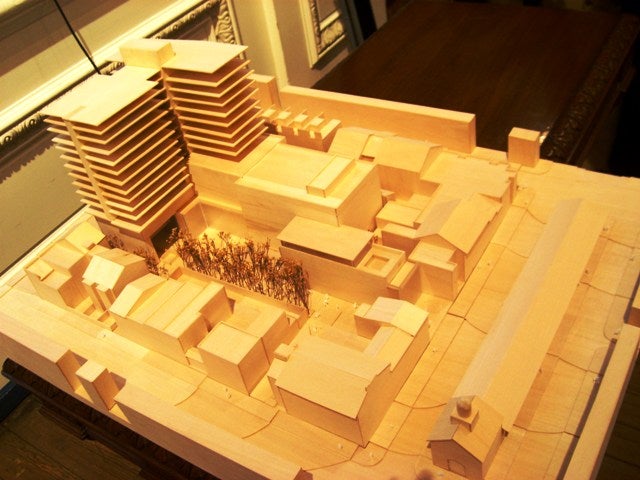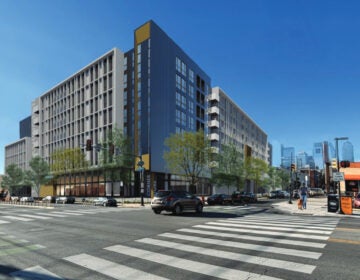Politics, development and reform

March 6
Previous coverage
By Matt Blanchard
For PlanPhilly
They may never run an “After School Special” dealing with real estate development in Philadelphia, but at least we have a working title: Stamper Square.
Back in the ‘70s and ‘80s, episodes of ABC’s heavy-handed After School Specials dealt with different social problems – drugs, sex, mental illness – and had titles like The Boy Who Drank Too Much, and My Dad Lives in a Downtown Hotel. The moral message was hard to miss.
Well, zoning reformers take note: Society Hill’s controversial Stamper Square project looks to many like a scripted daytime drama of what’s wrong with the current system, and how hard it will be to fix it. Whatever the merits of a 15-story luxury hotel and condominium on Head House Square, the fight over Stamper appears to be precisely the unpredictable, time-consuming, contentious mess that inspired zoning reform in the first place. It’s got red-faced community meetings, landowners connected to a reported FBI investigation, and a pivotal politician who counts the developer among his campaign donors.
You could call the saga, My Downtown Hotel has a Zoning Problem, and it’s playing right now.
“What I see is a systemic problem,” says Gregory Heller of the Delaware Valley Regional Planning Commission. “We’ve gotten used to a system that’s so dysfunctional that many people don’t know how the system was supposed to be functioning.”
On Thursday, with Society Hill’s civic association bitterly split after nearly dozen public meetings, Councilman Frank DiCicco trumped the community’s hand by introducing legislation to rezone the site to fit Stamper’s 166-foot bulk. Yet his chief aide, Brian Abernathy, is frank about the situation: “Stamper Square is a perfect example of what we’re hoping to avoid in the future.”
Let’s Make A Deal
Heller and Abernathy aren’t dissing the project, which has many supporters, but rather the process. In the absence of a strong planning commission, local community organizations with no planning expertise take on complex negotiations with developers. Developers, for their part, bargain hard, ignoring a zoning code assumed to be out-of-date and approaching every project as a negotiation.
Before Stamper Square, the land owners had proposed a 40-story mixed use tower, sending the neighbors into fits. The site, a vacant hole left by the failed NewMarket shopping mall, is zoned for a 6-story height limit.
“They were starting at 40 stories and saying ‘Let’s make a deal,’” says neighborhood attorney Paul Boni. “They were completely ignoring the code.”
Even under a code re-write, Boni says, Society Hill’s historic low-rise zoning is unlikely to change. “What needs to change is a political climate that allows developers to come in asking for twice what the law allows.”
Time After Time
Boni says it’s “hard to overestimate” how much time he’s spent on the project, and he’s not alone. Opponents and supporters alike poured thousands of man and woman-hours into neighborhood meetings to review each new proposal.
Stamper developer Marc F. Stein is no different. He might have thought it was a done deal when the project was received warmly by Planning Commission staff (“They loved it,” Stein says), but a year later he’s headed into what will likely be the most contentious moments yet: hearings soon to be scheduled before City Council.
“I feel like we’ve spent an awful lot of time trying to get some input,” Stein says. “It’s not like we tried to circumvent the community. We did six or seven redraws.”
(Nevertheless, Stein describes himself as the “happiest man alive,” in part because in 1992, he narrowly survived an industrial explosion that threw him through a window and down a 38-foot drop, leaving him paralyzed for months. “I wasn’t supposed to walk again,” he says.)
Suspicious Minds
With the intervention of councilman DiCicco, Stamper Square could get C4 zoning, enough of a building envelope to permit all 15 stories and prevent a group of neighbors from challenging the project before the Nutter-appointed Zoning Board of Adjustment.
Yet in the last two years, DiCicco’s campaign committee has received a combined total of $12,500 from parties involved with the project. Stein and a woman at his address named Jill Stein gave $7,500, while land owner Sant Properties gave $5,000.
According to the Daily News, Sant Properties’ $30,000 donation to another councilman, Jack Kelly, triggered an FBI investigation earlier this year.
When a major development seems to hinge on one politician’s support, should we be suspicious?
“There are a lot of guys who are donors, some of the donors are even involved in casinos,” DiCicco said yesterday. “It never affects my decision, but that’s one reason why [the upcoming Stamper hearings] will be a public debate.”
DiCicco said he authored the zoning reform legislation precisely because he’s tired of spending so much time on development issues.
“I wield a lot of power, make no mistake about it,” DiCicco said, “but I’d like some of that weight off my back, and I’d like for people who are experts in the field of development and city planning to make those decisions on the front end, rather than have to deal with it on the back end.”
What about the back end?
Translated, “front end” means the zoning code – the rule book setting expectations for developers and communities alike, and “back end” means the angry fray that breaks out when the zoning code is challenged.
The theory, also voiced in an interview yesterday by new Deputy Mayor for Planning Andrew Altman, is that once communities participate in mapping the zoning of their own neighborhoods, all parties will accept the limitations and work in harmony.
But hold the flowers and songbirds. As Altman knows, there’s a flaw in the theory: Even with a new code, projects like Stamper will divide communities.
“The city evolves and changes, and planning can’t always keep up,” Altman said. “Zoning reform will not be a panacea to these problems.”
Altman’s solution is to strengthen the Philadelphia Planning Commission.
“Your planning department should be able to come in and – not supplant the judgment of everyone involved – but provide some context, some professional recommendation about it, and shape the process in a much more proactive way,” Altman said.
Protecting the community’s voice
But over at DVRPC, a kind of planning think-tank for the region, Heller sees another hole in the theory.
“Even if we could snap our fingers and fix the zoning tomorrow, a lot of community groups would find themselves left out of the process,” Heller argues. While zoning reform is essential, the city also needs a regular system of community feedback.
Heller and his colleagues recently authored a report proposing several solutions.
Entitled Promoting Civic Design Excellence, the report details the use of Design Review Commissions in other cities across the country. Staffed by trained architects and planners, these commissions provide “back end” review for communities anxious about the impact of a new development.
Boston, Balitmore, Pittsburgh, Seattle and Portland all have design review commissions, Heller says, and many have the power to reject projects that do not meet aesthetic and streetscape standards. Philadelphia has lately tossed all such concerns to the ZBA, which is not legally entitled to address such matters. The city could either create a design review commission from scratch, or expand the power of its Art Commission to take on this role.
“In a perfect world, every parcel would be perfectly mapped, but that’s not how it works,” Heller said. “There will always be issues that come up, and when they do, you want design experts and the community to have a seat at the table of the legislative process.”
A perfect world will have to wait. For now, our proposed downtown hotel has a zoning problem, and in it, our zoning code commission has an object lesson in the challenges of reform.
Contact the reporter at blanchard.matt@gmail.com
WHYY is your source for fact-based, in-depth journalism and information. As a nonprofit organization, we rely on financial support from readers like you. Please give today.






